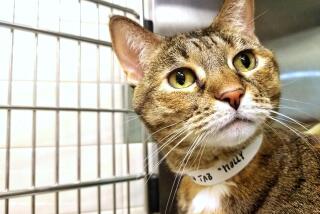Personality test aims to find purrfect matches
- Share via
It happens to all of us. You fall in love with someone’s looks . . . but then he’s not quite what you expected. Even, sometimes, if he’s a cat.
“People come in and say, ‘I had a black and white tuxedo cat before, so that’s what I want,’ ” says Jim Monsma of the Washington Animal Rescue League in Washington. “But cats are not all the same. They have widely divergent personalities.”
That’s why the shelter is using the Feline-ality program, developed by behaviorist Emily Weiss of the American Society for the Prevention of Cruelty to Animals.
Part of the ASPCA’s Meet Your Match program, which also includes Canine-ality for dogs, the program assesses a variety of behaviors in individual cats. It rates an animal on confidence and sociability, which Weiss’ research has shown are independent of each other.
The program then tallies those assessments to place the cat in one of nine personality categories, which can be matched with a family’s situation and desires.
It’s not unlike a magazine quiz to find out, “Which kind of cat are you?”
The program is used at 45 shelters, with additional ones preparing to employ it.
On this day in the Washington shelter, Monsma brings Barnaby the cat into an unfamiliar room and opens his carrier.
Barnaby shoots out and takes charge, checking out the room and everything in it. Monsma uses a stopwatch to track how much time Barnaby spends on social interactions. For example, he adds up how many seconds Barnaby spends trying to get on his lap. He also monitors his noises and blink rate, both indicators of sociability.
Monsma then initiates some interaction, offering a hand, three toys and a hug. Each transaction earns Barnaby some points. His total comes out high on both scales: He’s highly sociable and highly confident.
All of the types have fun, vivid names and descriptions. Barnaby is “leader of the band.” His opposite, a cat low on both scales, is called a “private investigator,” who stays out of trouble. A more middle-of-the-road cat is familiar to many people: the “personal assistant.” “You’re working on the computer? Let me press the keys. Reading the paper? I’ll hold the pages down for you. . . . You’ll wonder how you ever managed without me,” according to program literature.
Equally important to the Feline-ality program is the fact that people differ too.
Adopters fill out a questionnaire and the results give them results in a color code, telling them which set of personality types would be best for them to consider.
The program aims to end animal-human mismatches, often a reason cats are returned to the shelter, Monsma says.
Weiss says the program has helped increase adoptions in shelters that have tested the Feline-ality program, partly because people find the process fun.
Experts may differ on what details of a test can best predict a pet’s behavior in an adoptive home, says animal behaviorist, author and radio host Patricia McConnell.
But she applauds the efforts to enlighten people about the differences among cats, which have always been less well understood than dogs.
“They’re complicated, interesting animals with rich emotional lives that deserve to be treated well,” she says.
“Any kind of test is somewhat limited, but it’s an excellent idea to be thinking as much as we can about what’s the right cat for the right home and whether we can do some matchmaking.”
Weiss says people still sometimes fall in love with a cat that isn’t a perfect fit, but the program can help in those cases too: people who know what issues to expect are more prepared to deal with them.
But as Monsma says, “There are so many cats out there, why not get one that fits?”
More to Read
Sign up for Essential California
The most important California stories and recommendations in your inbox every morning.
You may occasionally receive promotional content from the Los Angeles Times.













